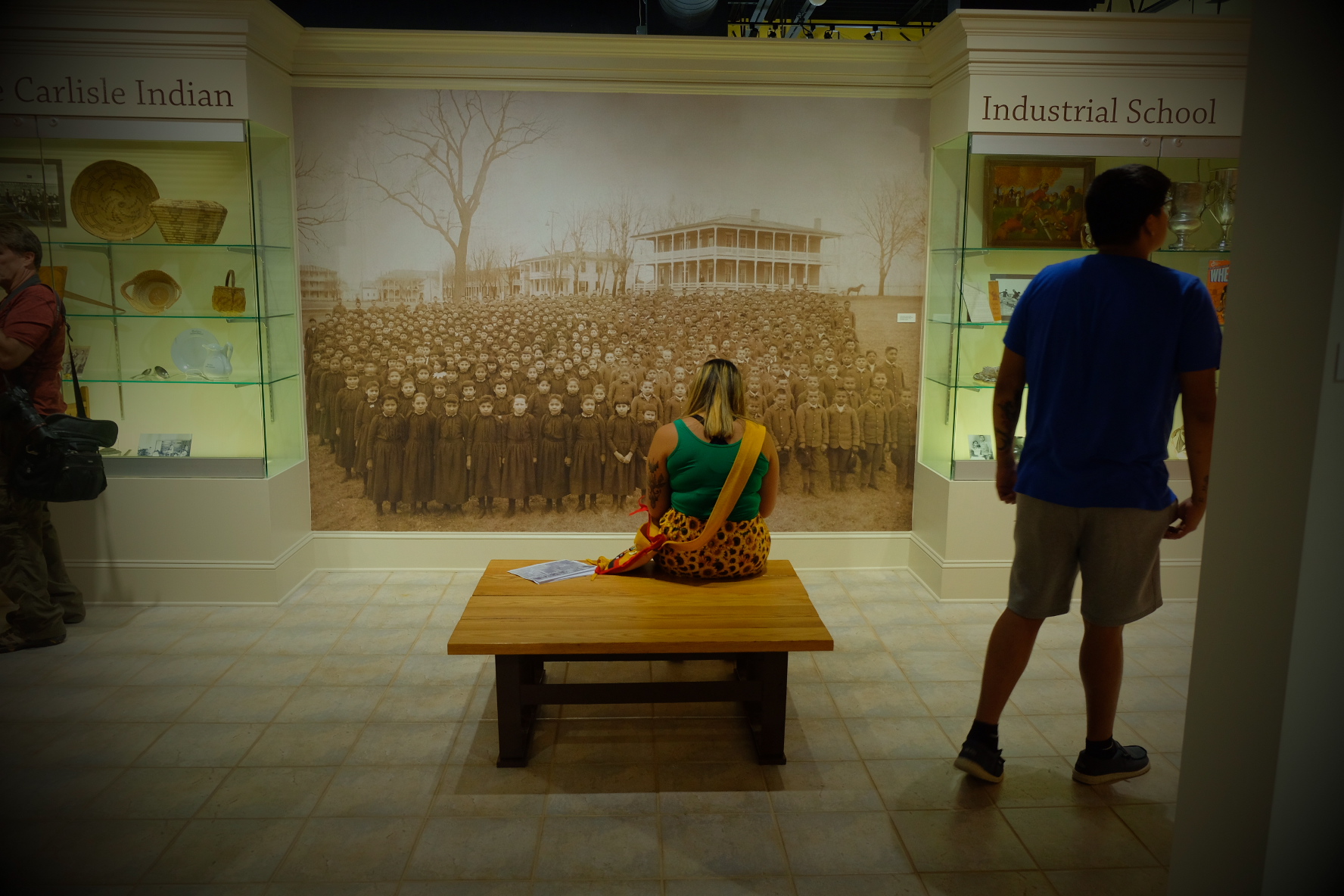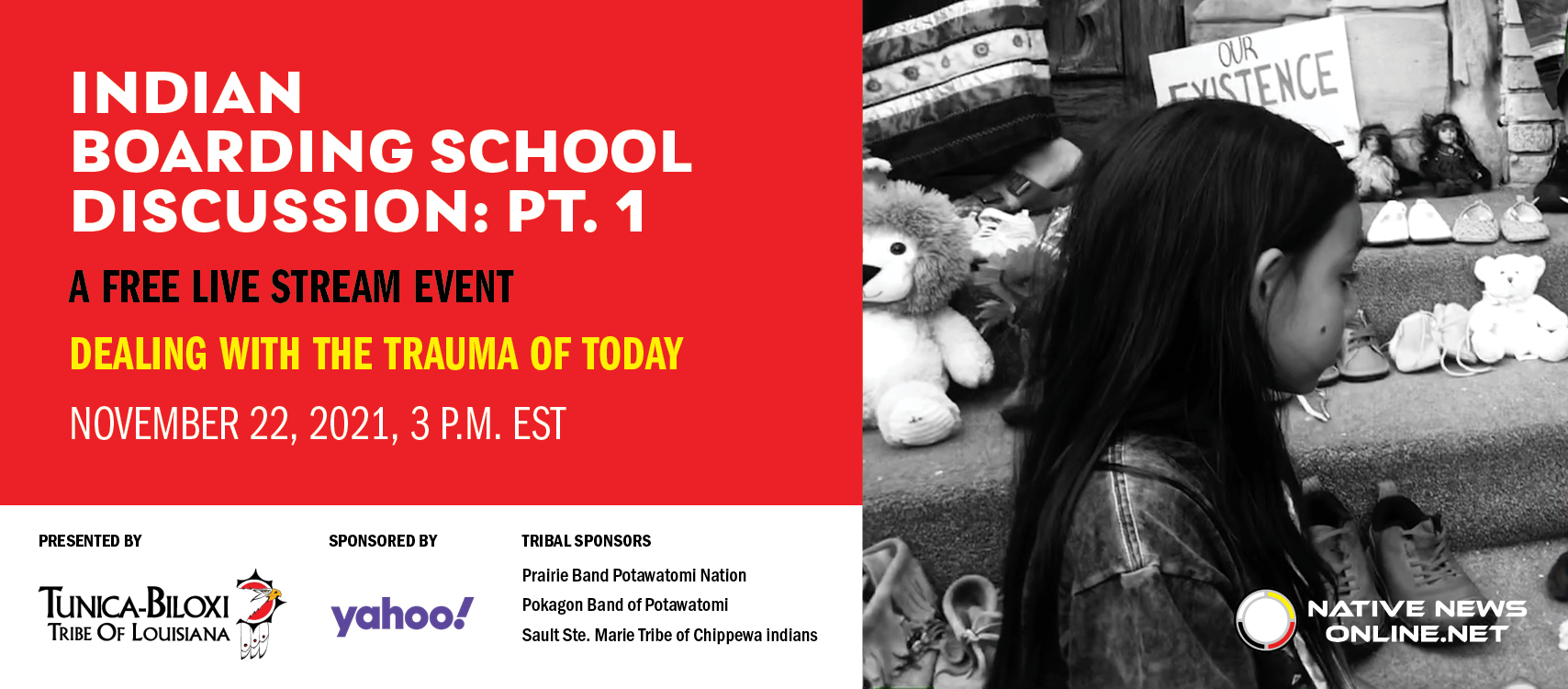
- Details
- By Native News Online Staff
GRAND RAPIDS, Mich.—Indigenous-led news outlet Native News Online will debut the first episode of a three-part livestream series called “Indian Boarding School Discussions” on Monday, Nov. 22.
The series, which will be broadcast on multiple social media outlets, highlights the role of Indian Boarding Schools in the cultural genocide of Native people in North America, as well as the generational implications today.
Want more Native News? Get the free daily newsletter today.
The first livestream in the series, "Indian Boarding Schools: Dealing with the Trauma Today” broadcasts on Nov. 22 at 3 p.m. EST. The free program will feature an overview history of Indian Boarding Schools, followed by a panel discussion with experts and Native American leaders, including Assistant Secretary of the Interior Bryan Newland; award-winning American Indian journalist Jenni Monet; Christine Diindiisi McCleave of the Turtle Mountain Ojibwe and executive director of the National Native American Boarding Schools Healing Coalition (NABS); and Denise Lajimodiere of the Turtle Mountain Ojibwe and co-founder and president of NABS.
The livestream is presented thanks to generous support from the Tunica-Biloxi Tribe of Louisiana. One of four federally recognized tribes in the state of Louisiana, The Tunica-Biloxi Indian Tribe is a successor to the historic Tunica, Biloxi, Ofo and Avoyel tribes. The Tribe owns and operates Paragon Casino Resort, Louisiana’s first land-based casino and the largest employer in Avoyelles Parish; Mobiloans, a Tribal lending enterprise; and Acacia Entertainment, a joint venture that produces films.
The series is also supported through a major sponsorship contribution from Yahoo, a global media and tech company connecting people to their passions. Yahoo reaches almost a billion people worldwide, bringing them closer to what they love – from finance and commerce to gaming and news – with trusted products, content and tech that fuel their day. For partners, Yahoo provides a full-stack platform to grow businesses and drive more meaningful connections across advertising, search and media.
"Storytelling and content are at the heart of Yahoo and we are proud to partner with Native News Online for Native American content as well as support important programming like 'Indian Boarding School Discussions'," said Nikki Thompson, Head of Multicultural Content at Yahoo.
Additional sponsors include the Prairie Band Potawatomi Nation, a federally recognized tribe of Neshnabé, headquartered near Mayetta, Kansas; the Sault Ste. Tribe of Chippewa Indians, a federally recognized tribe based in what is now known as Michigan’s Upper Peninsula; and The Pokagon Band of Potawatomi Indians, a federally recognized tribe based in southwestern Michigan and northeastern Indiana.
The livestream series is part of a year-long editorial project by Native News Online to heighten awareness of Indian Boarding Schools and their impact on Indigenous people in the U.S. and Canada.
In May of this year, the remains of 215 children were discovered in a mass grave at the former Kamloops Indian Residential School, once the largest residential school in Canada. The discovery sparked a reckoning of international media coverage, political dialogue and long-overdue awareness of the dark legacy of Indian Boarding Schools.
“The purpose of the ‘boarding schools’ was to destroy the culture of an entire race of people by stripping the identities of that culture’s most vulnerable members – its children,” Prairie Band Potawatomi Nation Chairman Joseph Rupnick said. “It’s a dark mark on the history of all people, lasting far too long only because it existed in secrecy and shadow. By shining a light into those shadows through education and programs like this, we can begin to heal our collective culture. The Prairie Band Potawatomi Nation proudly supports Native News Online’s live stream series as it shines more light on this difficult topic.”
During the 19th and 20ths centuries, there were as many as 350 government-funded, often church-run Indian Boarding schools in the United States alone. Hundreds of thousands of Native American children were forcibly separated from their families and removed from their homes during that time. Native students were subject to abuse in a comprehensive attempt to force Native Americans to assimilate. Enrollment in boarding schools was at its highest point in the 1970s.
In June, Secretary of the Interior Deb Haaland announced a Federal Indian Boarding School Initiative, an investigation into the practices, history, and impact of Indian Boarding Schools.
"Boarding schools have long caused irreparable harm to countless Native American children and their families, and the Tunica-Biloxi Tribe applauds the Biden Administration and Interior Secretary Deb Haaland for working to heal these wounds,” said Marshall Pierite, chairman of the Tunica-Biloxi Tribe of Louisiana. “The Federal Indian Boarding School Initiative is an excellent first step to begin the long healing process, and we look forward to constructive conversations with survivors, tribal leaders, stakeholders and our federal partners. We appreciate the opportunity to engage in the Interior Department’s Boarding School consultation sessions, honoring those who have suffered through these traumatic experiences and moving forward together.”
Parts two and three of "Indian Boarding School Discussions" will be broadcast in February and April 2022.
"Indian Boarding School Discussions: Dealing with the Trauma Today"
Monday, Nov. 22
FREE, 3 p.m. EST.
Watch Here: https://fb.me/e/2PuiRD7Lb
More Stories Like This
Native News Weekly (August 25, 2024): D.C. BriefsDeb Haaland Rolls Out Affordability Agenda in Albuquerque
Boys & Girls Clubs and BIE MOU Signing at National Days of Advocacy
National Congress of American Indians Mourns the Passing of Former Executive Director JoAnn K. Chase
Navajo Nation Mourns the Passing of Former Vice President Rex Lee Jim
Help us defend tribal sovereignty.
At Native News Online, our mission is rooted in telling the stories that strengthen sovereignty and uplift Indigenous voices — not just at year’s end, but every single day.
Because of your generosity last year, we were able to keep our reporters on the ground in tribal communities, at national gatherings and in the halls of Congress — covering the issues that matter most to Indian Country: sovereignty, culture, education, health and economic opportunity.
That support sustained us through a tough year in 2025. Now, as we look to the year ahead, we need your help right now to ensure warrior journalism remains strong — reporting that defends tribal sovereignty, amplifies Native truth, and holds power accountable.
 The stakes couldn't be higher. Your support keeps Native voices heard, Native stories told and Native sovereignty defended.
The stakes couldn't be higher. Your support keeps Native voices heard, Native stories told and Native sovereignty defended.
Stand with Warrior Journalism today.
Levi Rickert (Potawatomi), Editor & Publisher


